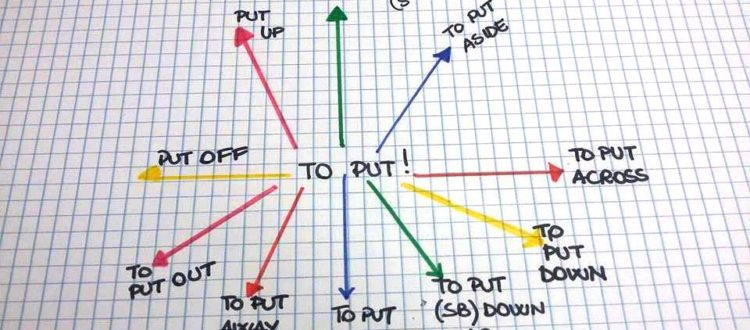10 Phrasal verbs con put
Phrasal verbs con put
Questa settimana riprendiamo l’argomento dei phrasal verbs con put che tanto spesso si inseriscono nella conversazione o nel listening, creando dubbi e incertezze. Di solito, l’aspetto più ingannevole dei phrasal verbs con put è il fatto che possano avere molteplici significati, oltre alla variazione collegata alla particella, o ancora la possibilità di separare il verbo dalla particella e quindi il posizionamento di quest’ultima all’interno della frase. Il verbo della settimana è put che, nella sua accezione principale, significa “mettere”.
Example: Don’t put your feet on the table, please!
Tuttavia, nella conversazione quotidiana, il verbo “put” può essere accompagnato da tante particelle (preposizioni e avverbi) come ON, ONTO, IN, INTO, WITH, UP, DOWN, OUT, AWAY, ASIDE, ACROSS e cambiare totalmente di significato. Vediamo quali sono i più usati!
1) Put (sth) in (sth) ( mettere qualcosa dentro, inserire)
Example: “Please, put the envelope in the mailbox”
2) Put aside (mettere da parte, conservare)
Example: In order negotiate a peace agreement, both Countries should put aside their differences on immigration policy.
3) Put (sth) across (trasmettere, far arrivare un concetto)
Example: Angela put her ideas across to the audience clearly and effectively
4) Put (sth) down (annotare, segnare)
Example: “Whenever ispiration comes, I put down my thoughts in a notebook”
5) Put (sb/sth) down for (sth) (considerare per candidatura)
Example: “John, why don’t you put yourself down for sales director? The company needs a new start”.
6) Put (sb) through (mettere in collegamento)
Example: ” Hi! Can I speak with Mrs March?
“Hold on. I’ll put you through”
7) Put away (mettere da parte, risparmiare)
Example: Every month, Susie puts something away to buy a new car.
8) Put out (rendere pubblica una notizia)
Example: The evidence for the President’s wrongdoing was put out in a dossier by the CIA
9) Put up 1 / with 2 (1 offrire alloggio – 2) tollerare, sopportare)
Example 1: “I’d be happy to put you up for the night”
Example 2: “I can’t put up with this noise anymore!”
10) Put off (sth): rimandare
Example: “Never put off until tomorrow what you can achieve today!”
Espressioni colloquiali con “put”
Questi sono i phrasal verbs con put più facili da incontrare nel dialogo quotidiano e che è bene memorizzare attraverso l’uso frequente. Il trucco per non dimenticarli è utilizzarli in modo opportuno in un contesto di riferimento appropriato durante la conversazione, nel writing (da una mail a un report, fino alla chat, se chattate con persone in inglese).
Ma ci sono anche molto espressioni colloquiali con put. Le più comuni sono:
Put (sth) in jeopardy: mettere in pericolo
Example: “Stopping to collect your belongings in the event of an evacuation will put your life in jeopardy and those of other people, too”.
Put (sth) in operation: avviare, lanciare
Example: “The new plan will be put in operation soon”
Put (sth) in order: mettere in ordine, riordinare
Example: “Could you please put the applications in alphabetical order?”
Put (sth) in practice: mettere in pratica
Example: “Now that you know the rules of chess, try to put them into practice”
Put (sth) in place: introdurre, mettere in atto, mettere qualcuno al proprio posto
Example: The time has come to put extreme measures in place.
Example: As Stephanie couldn’t stop chatting in the classroom, the teacher had to put her in her place”
Put (sth) into words: esprimere a parole
Example: “When it comes to love, it can be hard to put feeling into words”
Put (sb) in touch with: mettere in collegamento
Example: “If you need a reliable tourist guide in Thailand, I’ll put you in touch with the one who drove me around last year”
Se pensi che questo articolo ti sia stato utile, lasciaci un commento e condividilo sui social. Grazie!


